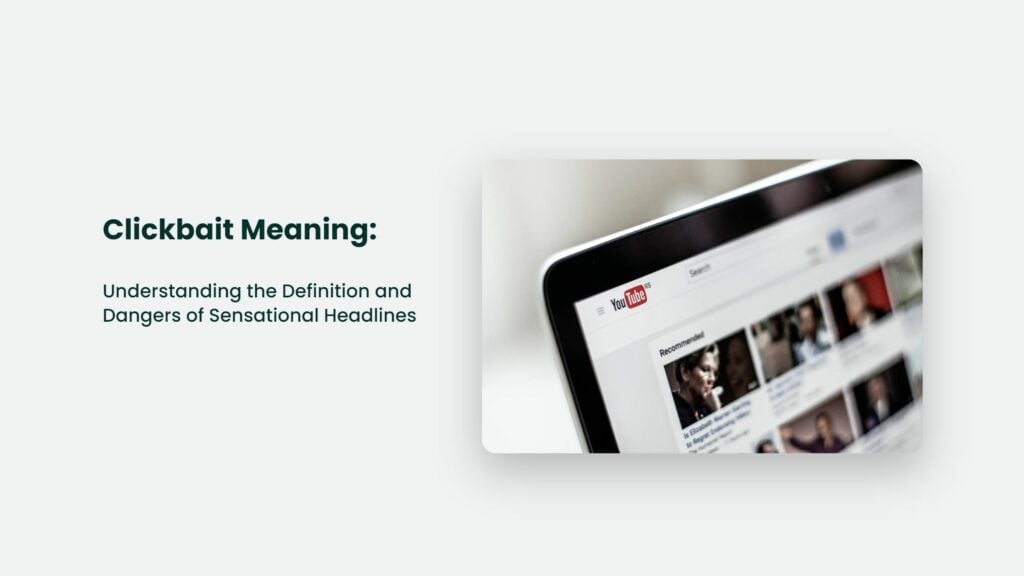

Clickbait Meaning: Understanding the Definition and Dangers of Sensational Headlines

As Seen On
As a digital native and content creator, I’ve seen it all. From funny memes to heart-wrenching news stories, the internet is a melting pot of information and emotions. But I just can’t stand one type of content – clickbait. You know, the kind, the headlines that promise the world but deliver nothing but disappointment.

But what exactly is clickbait meaning, and why is it so prevalent on the internet?
Clickbait Meaning:
Clickbait content uses sensational or misleading headlines to entice people to click on a link and read more. The goal of clickbait is to generate clicks, not to provide valuable information or insights.
Think of it as the digital equivalent of a carnival barker, trying to lure you into the tent with promises of wonders beyond your wildest dreams. But once you’re inside, you realize it’s just a cheap trick.
Why is Clickbait So Popular?
Clickbait is popular because it works. People are naturally curious and love to be entertained; clickbait headlines tap into that curiosity and promise to deliver the goods. Once people click the link, they’re disappointed that the content doesn’t match the headline.
But here’s the thing – clickbait isn’t just disappointing; it’s also dangerous. Clickbait headlines are often used to spread false information or direct people to websites filled with malware or malicious content. So, it’s not just a case of feeling let down; it’s a case of putting your personal information and security at risk.
How to Spot Clickbait
So, how can you spot clickbait and avoid falling for it? Here are a few tips:
- Sensational Headlines: If the headline promises something that seems too good to be true, it probably is.
- Lack of Information: Clickbait headlines often give very little information about the content of the article, leaving you guessing and curious to find out more.
- Emotional Language: Clickbait headlines often use emotional language to pull you in, such as “You won’t believe what happened next!” or “This will shock you!”
- Clickbait Websites: Some websites are notorious for publishing clickbait articles. If you find yourself on one of these sites, be cautious and check the credibility of the information before clicking on any links.
Frequently Asked Questions:
Why is clickbait popular?
Clickbait is popular because it works. People are naturally curious and love to be entertained, and clickbait headlines tap into that curiosity and promise to deliver the goods.
The Bottom Line
Clickbait may be tempting, but it’s not worth it. The headlines promise the world, but the content is often disappointing and can even put your personal information and security at risk. So, the next time you see a headline that seems too good to be true, take a step back, think twice, and avoid falling for clickbait.
Konger
Up until working with Casey, we had only had poor to mediocre experiences outsourcing work to agencies. Casey & the team at CJ&CO are the exception to the rule.
Communication was beyond great, his understanding of our vision was phenomenal, and instead of needing babysitting like the other agencies we worked with, he was not only completely dependable but also gave us sound suggestions on how to get better results, at the risk of us not needing him for the initial job we requested (absolute gem).
This has truly been the first time we worked with someone outside of our business that quickly grasped our vision, and that I could completely forget about and would still deliver above expectations.
I honestly can't wait to work in many more projects together!
Disclaimer
*The information this blog provides is for general informational purposes only and is not intended as financial or professional advice. The information may not reflect current developments and may be changed or updated without notice. Any opinions expressed on this blog are the author’s own and do not necessarily reflect the views of the author’s employer or any other organization. You should not act or rely on any information contained in this blog without first seeking the advice of a professional. No representation or warranty, express or implied, is made as to the accuracy or completeness of the information contained in this blog. The author and affiliated parties assume no liability for any errors or omissions.

